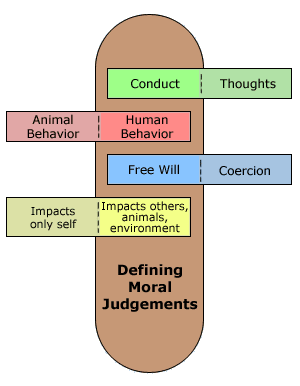Main Content
Lesson 2: Morality, Ethics, and Human Behavior
Defining Ethics and Morality
Often, the terms ethics and morality are used as though they have the same meaning. This is not the case. Ethics may be described as the examination of how particular acts are agreed upon as good or bad. Morality (morals) is used to describe as principles of right or wrong. While morality outlines good conduct, offering rules for proper action, ethics is the study of morality, the study of what constitutes good conduct (Albanese, 2016).
In the field of ethics, there are several branches: metaethics, normative ethics, applied ethics, and professional ethics. Metaethics refers to the philosophical quest of the exact definitions of specific ethical terms. Normative ethics refers to the study of our moral duties. Applied ethics reviews the manner in which normative ethics are applied in every day life. Professional ethics is a subset of applied ethics in that its focus is on that which is classed as good within a certain profession.
Moral judgments have been found to have a number of common elements. For example, moral judgments must focus on tangible behavior and not simply concepts. These behaviors must be those of humans and not animals, actions performed as the result of free will and only in relation to those actions that affect others, animals, or our environment.
Is it possible for persons to engage in behavior about which moral judgment could be made, but the individual performing the behavior not judged as immoral? Yes! There have been and will continue to be occasions when persons will engage in behavior judged immoral and not be judged as such. For example, in August 2003, a pizza delivery person named Brian Douglas Wells was forced to commit a bank robbery because some unknown person had locked a bomb to his neck and threatened to detonate it if he did not cooperate with the robbery. After robbing the bank, the police stopped him and before they could remove the device, it was detonated killing the pizza delivery person. Clearly, this person was under duress, thus without free will. Would you judge his actions (i.e., bank robbery) as immoral? Would you judge *him* as immoral based on this incident?
Our legal system also protects persons declared as mentally incompetent as not responsible for immoral behavior. Moral judgments contain a number of common properties.
- First, they are primarily focused on conduct and not simply thoughts;
- Second, only human behavior can be considered. The actions of animals do not qualify;
- Third, only actions carried out as a consequence of free will may be considered. Any action carried out because the person was under duress does not qualify nor any action committed by a person incapable of rational thought;
- Finally, moral judgments are possible only for actions that impact other persons, animals, or the environment.
Duties and values are also studied in ethics. A duty may be defined as any action that would characterize a moral person. For example, persons employed in criminal justice are often said to be held to a higher standard of duty than the rest of the citizenry. Prioritizing values assists in the ethical decision-making process.

Reference:
Albanese, J. S. (2016). Professional ethics in criminal justice: Being ethical when no one is looking (4th ed.). Boston: Pearson.
